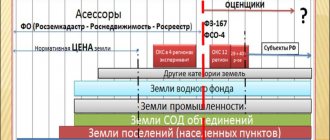All articles
28813
2021-03-13
In this article you will learn how the assessment by a cadastral engineer is carried out, what to do if the cadastral value is determined incorrectly, how to submit an application correctly, how to challenge the cadastral value, what documents are needed and in which state. authorities need to be contacted.
Challenging the cadastral value of a land plot or any real estate in 2021 is based on new valuation rules, which raises many questions and controversial issues among citizens. All issues related to the cadastral value of real estate are considered by the Federal Cadastre and Cartography Service (Rosreestr). If you have any doubts, the first thing you need to do is go there.
The owner of the premises needs to prepare an appeal, after its consideration, representatives of Rosreestr will recalculate the cost of the property. If the appeal to the first instance does not produce results, an appeal is submitted to the commission for challenging the cadastral value (under the Rosreestr of the region).
Another option is to go to court. It is important to prepare the claim correctly and attach all the necessary documents.
Features of the use of cadastral value
You should use the value of the property in the following cases:
- When calculating land tax.
- When calculating tax on any existing property. This can be a residential or non-residential premises, an office, a retail outlet, or a catering establishment.
- When calculating rent for land plots located under the department and owned by Russia.
The value of the property is assessed according to new rules adopted in 2021. If the owner sold a home or other type of real estate on January 1, 2021 and the total cost is less than 70% of the cadastral value, then this amount (70% of the cadastral value) will be considered the income of the subject (owner).
The cadastral value can be recalculated once every 2 years (if it is a city of federal significance), in other cases once every 5 years. According to the law, challenging the cadastral value results is possible for 5 years, until the new results come into force.
Previously, recalculation was calculated starting from the year; challenging the cadastral value in 2021 is carried out according to new rules. From January 2021, recalculation is calculated for the entire period of validity of the disputed value of the property.
Attention! Before contacting any of the above authorities, you need to order a certificate from the Unified State Register of Real Estate on the cadastral value, which will confirm the relevance of the data (cadastral value). You can order this certificate on this page, directly from Rosreestr in electronic form.
Challenging the cadastral value of an apartment – when required
Challenging the cadastral value of real estate is carried out in a number of cases:
- If the owner does not agree with the assessment of the premises.
- Errors were identified when reviewing the assessment results.
- Valuation of real estate that is inconsistent with market prices – undervalued or overvalued.
Another reason that causes anxiety and mistrust is a reduced or increased tax rate. Challenging the cadastral value of a plot or real estate is carried out in different ways. In each situation, the owner needs to understand how to behave, what to do, what documents to prepare.
Who can challenge the cadastral value?
Every citizen who believes that mistakes were made and his rights were violated can challenge the cadastral value in Moscow or the regions.
The main group includes:
- Individuals whose rights and obligations were violated.
- Legal entities whose rights were also violated.
- Public authorities, if the building is under the control and order of the state or municipality.
Disputes are considered by a commission or in courts.
From when does the new cadastral value apply?
Changes have also been made regarding the application of the new value after the revision of the cadastral valuation.
After the error is corrected, the updated cost will be applied (Article 18 of Law No. 237-FZ):
- in case of its decrease - retrospectively, i.e. from the beginning of using an erroneously determined cadastral value;
- if it increases, it is promising, i.e. from January 1 of the year following the year in which the error was corrected.
Required documents
Cases challenging the cadastral value results are considered only if all the documents submitted by the owner of the building are available. You can challenge the results by contacting a special commission or going to court. After checking, the result will be issued. To submit an appeal you need to have the following package of documents:
- Passport of the person filing the application.
- An official request addressed to government authorities.
- A document that states the cadastral price of the property (a certificate of cadastral value or an ordinary extract from the Unified State Register of Real Estate).
- Verdict of the commission assessing the property.
- Documents confirming that the applicant is the owner of the property.
The applicant needs to prepare undeniable facts and evidence.
Important! A certificate of cadastral value is prepared on average 1-3 working days, but you can also order an extract from the Unified State Register of Real Estate (readiness up to 24 hours)
How to correct errors in the cadastre?
As practice has shown, over the years of assessments, state budgetary institutions (SBUs) have made various types of errors when calculating cadastral values.
Correcting even minor errors took a long time.
Now this procedure has been simplified. The reason for the occurrence of errors lies in the mass nature of the assessment - “in large strokes”, without taking into account the individual characteristics of the object. And an object may be in a dilapidated state in a certain area, so such objects cannot be “brushed with the same brush.”
Many technical errors were also made. For example, a typo, incorrect address of the property.
Errors made in determining the cadastral value of real estate can be corrected within 5 years from the date of entering information about the cadastral value into the Unified State Register of Real Estate. Accordingly, from January 1, 2021, for 5 years, you can submit an application to the State Budgetary Institution to correct errors (clause 21 of the Federal Law of July 3, 2016 No. 237-FZ). Previously, an application could only be submitted during the period while the cadastral value of the property was current.
Starting from 2021, an application for correction of errors is submitted using a new form, approved. By order of Rosreestr dated 08/06/2020 No. P/0286.
The new form allows you to submit an application for several properties at once, which significantly reduces the time spent on paperwork.
An application for correction of errors can be submitted in several ways:
- in paper form by contacting the State Budgetary Institution directly;
- in electronic form via the Internet, signing with an enhanced electronic signature;
- through the MFC;
- by mail;
- through the government services portal.
At the same time, the “cadastral” Law clearly states that if the State Budgetary Institution makes a decision to correct errors, then it must check whether there are any errors in relation to other real estate objects, including neighboring and adjacent objects of the same type (clause 15 of Article 21 of Law No. 237-FZ).
That is, if the owner indicated one property, but he has several of the same type of property, the State Budgetary Institution must correct the errors without an application for these properties.
The period for consideration of an application for correction of errors is 30 days (Clause 16, Article 21 of Law No. 237-FZ). Then the State Budgetary Institution recalculates the cadastral value within 45 days from the date of filing the application. After making a decision, the State Budgetary Institution notifies the owner of the property within 3 working days. And within the same period, the State Budgetary Institution transmits information about the change in value to Rosreestr for entering the new value into the Unified State Register of Real Estate.
The procedure for challenging the cadastral value
The procedure for challenging the cadastral value depends on which body the applicant applies to.
Contacting the State Budgetary Institution
The first authority you need to contact is the State Budgetary Institution. You can submit an appeal here if errors are identified, information does not match, or the valuation of the property does not correspond to the market price.
The State Budgetary Institution is a budgetary institution where every citizen whose rights have been violated can apply. Here calculations will be made, you can find out information about the characteristics of the property. After considering the appeal, representatives of the State Budgetary Institution have the right to independently carry out a recalculation, and then send the received data to Rosreestr (). The application must be accompanied by a full package of documents: passport, application, certificate of the full value of the property, ownership documents. All copies provided must be notarized.
Is the cadastral value overestimated or underestimated?
The cadastral value of an apartment, plot or other object rarely coincides with market prices. Usually it is significantly higher, which leads to inflated tax and rental payments. In addition, the cadastral value of a building or premises remains unchanged for several years, while a competitive market can repeatedly change prices even within a year.
The owner can check for himself whether the cadastral value of the apartment or other property corresponds. To do this, you can find out the cost by cadastral number through the PPK, request a certificate or an extract from the Unified State Register, after which:
- compare the received data with information from the Internet about market prices for a similar object (for example, you can use the sites Domklik, Avito, and many other information aggregators);
- order an assessment report from an appraisal organization.
The second option is necessarily used to reduce the CS. Once the work is completed, the appraiser will issue a report indicating the market price. This document must be submitted to the regional Commission under Rosreestr, or to the court (depending on the method of challenge).
Expert commentary. To prepare a report, the appraiser studies documents for the property, uses open data from the competitive market, and conducts a survey. Since the report is made by a specialist professionally engaged in appraisal activities, the calculation indicator will exactly correspond to the market price of a particular object. You can order such services from our company.
How to prove that the cadastral value was determined based on unreliable information?
The cadastral valuation of real estate is carried out by a cadastral engineer, who is guided by many factors during the valuation. The specialist takes into account the location of the property, its size, in which zone the property is located (for example, a sanitary-protected zone), what special conditions for using the property, and the intended purpose of the property.
When assessing a premises, the material from which the walls are made, the service life of the building and its wear and tear are taken into account, whether the building is classified as an emergency building or not.
If one of the points was not taken into account or the cadastral engineer made an error when entering data, the assessment is unreliable, the applicant has the right to submit an appeal to correct the errors in the cadastral value results.
The application for correction of the cadastral value is accompanied by data from the Unified State Register of Real Estate and a certificate from the BTI (Bureau of Technical Inventory).
Example and example of reducing cadastral value - our cases
Below you can see an example of a report on the market price and an extract from the Unified State Register.
Sample appraiser report . The appraiser's report compares market prices for apartments to reduce the cadastral value.
Sample USRN extract . The EGRN extract contains a note indicating a reduction in the cadastral value by court decision.
Pre-trial procedure for challenging cadastral value
Pre-trial challenge of the cadastral value is carried out on the basis of a written request from the applicant to the commission for challenging the results of the cadastral value at the Rosreestr of the region (at the place of registration of the building).
The application must indicate the reason for the application. For example, challenging the established cost, unreliable information, inaccurate data. Depending on the reason for the appeal, a package of documents is collected, which should contain evidence of the offense.
30 days are given for consideration of the application and the documents attached to it after acceptance of the application. The commission will set a date for consideration. The applicant can attend the commission meeting and monitor the progress of the case.
Challenging is carried out in the presence of the following documents:
- Written request from the applicant.
- Extracts from the Unified State Register of Real Estate (you can order on the official website here rosreestor.online).
- A document confirming ownership.
- Materials confirming the unreliability of information.
The applicant receives notification of the date of the hearing 7 working days in advance. The decision is sent to the applicant within 2 working days from the date of the meeting.
Changes in challenging the cadastral value, signed on July 31, 2020 (Federal Law No. 269-FZ)
Dear Colleagues!
I present an overview of the agreements signed on July 31, 2020 by the President of the Russian Federation V.V. Putin. amendments to the Federal Law of July 3, 2016 No. 237-FZ “On State Cadastral Valuation” and a number of other laws regarding the procedure for challenging the cadastral value of real estate (Federal Law of July 31, 2020 No. 269-FZ).
Summary:
I. On plans for revaluation of the cadastral value of real estate in Moscow.
II. Changes in the Law “On State Cadastral Valuation”.
III. The relationship between the changes provided for by Law No. 269-FZ and the special rules of the CAS of the Russian Federation on challenging/recalculating the results of determining the cadastral value.
IV. In what order will it ultimately be possible to change the cadastral value of real estate during the transition period, i.e. until 01/01/2023.
V. Additional food for thought.
I. _ On plans for revaluation of the cadastral value of real estate in Moscow.
07.27.2020 Mayor of Moscow S.S. Sobyanin on his website www.sobyanin.ru reported:
“This year the Moscow Government will not conduct cadastral valuation of residential and commercial real estate. The 2021 cadastral value will continue to be used to calculate real estate tax amounts.
Why did I make this decision?
The law allows for cadastral valuation to be carried out at intervals of 2 to 5 years, but – ATTENTION! – as of January 1 . That is, in the cadastral valuation of 2021, it is impossible to take into account the impact of the COVID-19 pandemic, which no one had heard of on January 1” (https://www.sobyanin.ru/ekonomiya-4-mlrd-o-kadastrovoi-otsenke-nedvizhimosti -v-2020-godu).
The cadastral value for 2021 refers to the order of the Department of City Property of Moscow dated November 29, 2018 No. 40557 (as amended on June 22, 2020) “On approval of the results of determining the cadastral value of real estate in the city of Moscow as of January 1, 2021.” .
On the issue of conducting the next cadastral assessment of real estate Moscow Mayor S.S. Sobyanin promised to return in 2021. Additional food for thought on this issue is provided below (section No. 5).
With regard to challenging the cadastral value, firstly, it should be noted that in the message of Sobyanin S.S. We are talking about property tax and the cadastral value of capital construction projects. There has not yet been any clarification on the fate of the cadastral value of land plots and, accordingly, land tax.
Secondly, it is worth paying attention to the words “impact of the COVID-19 pandemic.” This year, this impact has affected most commercial real estate segments. Many employers have become interested in the possibilities of reducing office costs by transferring some of their employees to remote work. The number of vacant retail premises has also increased (https://cre.ru/analytics/80874). And the remaining tenants (from industries most affected by COVID-19) have the right to apply for a reduction/deferment of rent (for example, in accordance with the well-known Article 19 of the Federal Law of April 1, 2020 No. 98-FZ).
Along with a decrease in income from property management, its market value may also decrease. Therefore, against the backdrop of the Moscow Mayor’s announcement about the postponement of the revaluation of the cadastral value of real estate, the question of reducing it is quite obvious.
Challenging the cadastral value, as well as its initial establishment, is regulated by the Federal Law of July 29, 1998 No. 135-FZ “On Valuation Activities in the Russian Federation”, the Federal Law of July 3, 2016 No. 237-FZ “On State Cadastral Valuation” and the Code of Administrative Proceedings Russian Federation.
II . Changes to the Law “On State Cadastral Valuation”
07/31/2020 President of the Russian Federation V.V. Putin Bill No. 814739-7 “On Amendments to Certain Legislative Acts of the Russian Federation” was signed, which provides for changes to the norms on state cadastral valuation (Federal Law No. 269-FZ dated July 31, 2020, hereinafter referred to as Law No. 269-FZ). The bill was prepared by the Government of the Russian Federation and submitted to the State Duma in October 2021, adopted by the State Duma on July 21, 2020, and approved by the Federation Council on July 24, 2020 (https://sozd.duma.gov.ru/bill/814739-7). Law No. 269-FZ (with the exception of a number of its provisions) comes into force ten days after 07/31/2020, when it was officially published (https://publication.pravo.gov.ru/Document/View/0001202007310085).
One of the changes provided for by Law No. 269-FZ is the exclusion from the Law “On State Cadastral Valuation” of the rule on the procedure for challenging the cadastral value of real estate.
In accordance with the wording of Part 1 of Art. 22 of the Law “On State Cadastral Valuation” before the amendments made to it by Law No. 269-FZ, the results of determining the cadastral value can be challenged by legal entities and individuals in the relevant commission if it is created in a constituent entity of the Russian Federation or in court. To go to court, a preliminary application to the commission is not mandatory. The basis for challenging the cadastral value is an assessment report confirming the lower market price of the corresponding object as of the date as of which its cadastral value was determined (Part 7 of Article 22 of the Law “On State Cadastral Valuation”).
Law No. 269-FZ recognizes Art. 22 of the Law “On State Cadastral Valuation” (“Consideration of disputes regarding the results of determining the cadastral value”), which has become invalid and introduces Art. 22¹ (“Establishing cadastral value in the amount of market value”), which provides that the cadastral value of a building, premises, structure, unfinished construction site, parking space, land plot can be established by a budgetary institution in the field of state cadastral valuation in the amount of the market value of the corresponding of a property at the request of legal entities and individuals (with an attachment of an assessment report), if the cadastral value affects the rights or obligations of these persons (Part 1 and Part 5 of Article 22¹ of the Law “On State Cadastral Valuation” as amended by Law No. 269-FZ ).
According to Part 15 of Art. 22¹ of the Law “On State Cadastral Valuation” as amended by Law No. 269-FZ “the decision of a budgetary institution regarding an application for establishing market value may be challenged in court in administrative proceedings. Simultaneously with challenging the decision of a budgetary institution, a demand may also be submitted to the court to establish the cadastral value of a property in the amount of its market value.”
For the provisions of Law No. 269-FZ, recognizing Art. 22 of the Law “On State Cadastral Valuation” is no longer in force, and Art. 22¹ of this law, which came into force, established a transition period until 01/01/2023. The moment of refusal to apply Art. 22 and the beginning of application of Art. 22¹ of the Law “On State Cadastral Valuation” within the specified period is determined by the highest executive body of state power of each constituent entity of the Russian Federation independently (Part 2 of Article 6 of Law No. 269-FZ). If during this time the highest executive body of state power of a constituent entity of the Russian Federation does not make such a decision, the provisions of Law No. 269-FZ on the transition from Art. 22 to Art. 22¹ will come into force in this region on 01/01/2023. In any case, this transition can actually be carried out no earlier than the approval by the Ministry of Economic Development of Russia of the application form for establishing the cadastral value of a real estate property in the amount of its market value (Part 3 of Article 22¹ of the Law “On State Cadastral Valuation”).
Thus, in accordance with Law No. 269-FZ:
• the name of the action under consideration changes from challenging the results of determining the cadastral value (Article 22) to establishing the cadastral value of a property in the amount of its market value at the request of an interested person (Article 22¹);
• the final result and the basis for it remain the same as before (the cadastral value of the property is established in the amount of its market value, confirmed by the assessment report);
• regardless of the name of this action, the powers to implement it are redistributed from the relevant commissions to the budgetary institution;
• after the entry into force of Art. 22¹ is excluded (as intended by the legislator) contained in Art. 22 of the Law “On State Cadastral Valuation”, the opportunity to immediately go to court in order to change the result of determining the cadastral value (which, according to Part 1 of Article 248 of the CAS of the Russian Federation, is carried out by the court on the basis of the same determination of the market value of the object) bypassing the out-of-court option (which, according to Law No. 269-FZ is to send an application to a budgetary institution);
• the procedure for establishing the market value of a property is brought into uniformity with the procedure for correcting an error made in determining the cadastral value, regulated by Art. 21 of the Law “On State Cadastral Valuation” both in the current version and in the version of Law No. 269-FZ.
These conclusions are partially confirmed by the motives for preparing bill No. 814739-7, set out in the explanatory note (https://sozd.duma.gov.ru/bill/814739-7), paragraph three on the first page of which states: “With regard to the correction of accumulated errors in previously approved cadastral valuation results, the bill provides for the dissemination of norms for mass correction of errors provided for by the law on state bonds and involving the consideration by authorized authorities of constituent entities of the Russian Federation of requests from copyright holders to correct such errors, including through the existing network of MFCs, and their correction without the need to challenge the assessment results in court or a dispute resolution commission on the results of determining the cadastral value.”
You can also note that the concepts of “cadastral value” and “market value” are different and do not include one another (market value is not one of the types of cadastral value and vice versa; see paragraphs two and eight of Article 3 of the Law “On Valuation Activities in the Russian Federation"), from which the logical conclusion follows - establishing the cadastral value of a property in the amount of its market value, by and large, does not challenge the result of determining the cadastral value. In essence, challenging the results of the cadastral value is either correcting an error made when determining the cadastral value (Article 21 of the Law “On State Cadastral Value”, both in the current version and in the wording of Law No. 269-FZ), or challenging the act of the authorized body of the subject of the Russian Federation on approval of the results of determining the cadastral value if it does not comply with any legal norms.
The explanatory note also reveals the motive for transferring powers to establish the market value of a property from commissions to a budgetary institution: “... the bill provides for a change in the mechanism for extrajudicial establishment of cadastral value in the amount of market value - a transition from the formal consideration of relevant applications in commissions for the consideration of disputes about the results of determining the cadastral value value for their substantive consideration in state budgetary institutions of the constituent entities of the Russian Federation that determine the cadastral value. This proposal is aimed at increasing the transparency and predictability of consideration of this category of cases, and reducing subjectivity in decision-making.” Only practice can show to what extent these expectations will be met.
III . The relationship between the changes provided for by Law No. 269-FZ and the special rules of the CAS of the Russian Federation on challenging/recalculating the results of determining the cadastral value.
Law No. 269-FZ does not provide for amendments to the Code of Administrative Proceedings of the Russian Federation, Chapter 25 of which establishes the specifics of proceedings in cases of challenging the results of determining cadastral value and, among other things, provides for challenging decisions of commissions that are no longer mentioned in Art. 22¹ of the Law “On State Cadastral Valuation”.
According to paragraph 1 of Art. 245 of the CAS RF, legal entities and citizens have the right to apply to the court with an administrative statement of claim to challenge the results of determining the cadastral value, including (note: but not exclusively) challenging the decisions of the commission for resolving disputes on the results of determining the cadastral value, as well as with an administrative statement of claim to challenge actions (inaction) of such a commission if the results of determining the cadastral value affect their rights and obligations.
At the same time, the basis for revising the results of determining the cadastral value in accordance with paragraph 1 and paragraph 2 of Part 1 of Art. 248 CAS RF is:
• unreliability of information about the property used in determining its cadastral value;
• establishing in relation to a real estate object its market value on the date as of which its cadastral value was established.
In this regard and on the basis of Part 2 of Art. 246 of the CAS RF, the following are attached to the administrative claim to challenge the results of determining the cadastral value:
• documents confirming the unreliability of information about the property used in determining its cadastral value, in the event that an application for revision of the cadastral value is submitted on the basis of the unreliability of the specified information;
• a report drawn up on paper and in the form of an electronic document, if an application for revision of the cadastral value is submitted on the basis of establishing its market value in relation to the property.
Thus, and taking into account the literal wording of paragraph 1 of Art. 245 of the CAS RF, not amended by Law No. 269-FZ, this Code formally provides for the possibility of going to court to challenge the results of determining the cadastral value based on establishing the market value of the object (according to the assessment report) without first contacting not only the relevant commission (now under Art. 22), but also to a budgetary institution (in the future under Article 22¹).
At the same time, Art. 22¹ of the Law “On State Cadastral Valuation”, in contrast to Art. 22 of the same law does not provide for the possibility for an interested person to choose a method for establishing the cadastral value of an object in the amount of its market value, namely: (a) by applying to the relevant budgetary institution to establish the cadastral value in the amount of the market value or (b) by sending an administrative claim to the court applications to challenge the results of determining the cadastral value of a property based on the same market valuation.
For the presence of a possible contradiction between Law No. 269-FZ (after all its provisions come into force) and Ch. 25 of the CAS RF also indicates that sending an application to a budgetary institution to establish the cadastral value of an object in the amount of its market value cannot be considered as a pre-trial procedure for resolving a dispute and, therefore, as a stage preceding going to court (clause 6, part 2, art. 246 CAS RF), since this statement in its essence is not aimed at challenging the results of determining the cadastral value (the rationale for this conclusion is set out in the previous section).
Only a negative decision of a budgetary institution on an application to establish the cadastral value of an object in the amount of its market value, but not the initial results of determining the cadastral value, is subject to challenge in this procedure (in administrative proceedings). When challenging this decision of a budgetary institution, an interested person can again make a demand to establish the cadastral value of a property in the amount of its market value, but not a demand to challenge the results of determining the cadastral value (Part 15, Article 22¹ of the Law “On State Cadastral Valuation”).
Law No. 269-FZ does not contain clarifications on the issue of application of the norms of Chapter. 25 CAS RF after the entry into force of Art. 22¹ of the Law “On State Cadastral Valuation”, limiting explanations only to the transition period. In accordance with Part 3 of Art. 6 of Law No. 269-FZ consideration of applications to challenge the results of determining the cadastral value filed before the date of transition to the application of Art. 22¹ of the Law “On State Cadastral Valuation”, specified in the decision of the highest executive body of state power of a subject of the Russian Federation, or until the end of the transition period (01/01/2023), if the highest executive body of state power of a subject of the Russian Federation did not make this decision, is carried out in accordance with Article 22 Law “On State Cadastral Valuation” (i.e., including in accordance with Chapter 25 of the CAS of the Russian Federation).
Taking into account the above, as well as the duration of the transition period and the uneven transition of regions to the application of Art. 22¹ of the Law “On State Cadastral Valuation”, it is difficult to expect a uniform understanding by the courts of the relationship between Art. 22¹ of the said law and the provisions of Chapter 25 of the CAS of the Russian Federation and, consequently, uniformity in the practice of their application. Not to mention the fact that the results of determining the cadastral value of a certain number of real estate objects will continue to be contested for some time according to the rules of another law, namely: the Law “On Valuation Activities in the Russian Federation” (Part 6 and Part 7 of Art. 24 of the Law “On State Cadastral Valuation”, paragraph “c”, paragraph 3, part 2, article 6 of Law No. 269-FZ, article 24.18 of the Law “On Valuation Activities in the Russian Federation”).
Taking into account that one of the goals of law is to streamline public relations, it may be worth considering amending Chapter 25 of the CAS of the Russian Federation to synchronize its provisions and the provisions of the Law “On State Cadastral Valuation” as amended by Law No. 269-FZ.
IV . In what order will it ultimately be possible to change the cadastral value of real estate during the transition period, i.e. until 01/01/2023.
1. The cadastral value of real estate, the determination of which began before the day the Law “On State Cadastral Valuation” came into force, can be challenged in the region according to the rules of Art. 24.18 of the Law “On Valuation Activities in the Russian Federation” until the date of transition of this region to the application of Art. 22¹ of the Law “On State Cadastral Valuation”, determined by the highest executive body of state power of a constituent entity of the Russian Federation, or until 01/01/2023 if the said authority does not make such a decision (Part 6 and Part 7 of Article 24 of the Law “On State Cadastral Valuation”, paragraph “a” clause 2 and paragraph “c” clause 3 part 2 article 6 of Law No. 269-FZ).
During this period of time, demands may be submitted to the relevant commission or directly to the court to challenge the results of determining the cadastral value of a property by establishing its market value.
2. The cadastral value of real estate, the determination of which was carried out in accordance with the Law “On State Cadastral Valuation”, can be challenged in the region according to the rules of Art. 22 of the Law “On State Cadastral Valuation” until the date of transition of this region to the application of Art. 22¹ of the Law “On State Cadastral Valuation”, determined by the highest executive body of state power of a constituent entity of the Russian Federation, or until 01/01/2023 if the said authority does not make such a decision (paragraph “a”, clause 2, part 2, article 6 of Law No. 269-FZ ).
During this period of time, demands may also be submitted to the relevant commission or directly to the court to challenge the results of determining the cadastral value of a property by establishing its market value.
3. From the date of the region’s transition to the application of Art. 22¹ of the Law “On State Cadastral Valuation”, specified in the decision of the highest executive body of state power of a constituent entity of the Russian Federation, and until 01/01/2023 challenging the cadastral value of all objects recorded in the Unified State Register of Real Estate, including those specified in paragraph 1 of this section of objects (if there are such disputes ), will be carried out according to the rules of Art. 22¹ of the Law “On State Cadastral Valuation” (paragraphs of clause 3, part 2, article 6 of Law No. 269-FZ).
During this period of time, with a very high degree of probability, the practice of implementing Art. 22¹ of the Law “On State Cadastral Valuation” may begin to differ diametrically in different regions and lean towards one of the following approaches (if changes to the CAS of the Russian Federation are not adopted):
• following the spirit of the law, according to which an interested person has the right to apply to establish the cadastral value of a property in the amount of its market value first to a budgetary institution in the field of state cadastral valuation. With this approach, a similar claim can be submitted to the court only if the specified budgetary institution refuses to satisfy this requirement and simultaneously with the submission of demands to the court to challenge the negative decision of this budgetary institution.
• following the letter of the law, according to which an interested person has the right to file a claim in court to challenge the results of determining the cadastral value of a property by establishing its market value instead of sending to a budgetary institution in the field of state cadastral valuation an application to establish the cadastral value of a property in the amount of its market value.
4. Consideration of applications to challenge the results of determining the cadastral value provided for in both paragraphs 2 and 1 of this section and filed before the date of transition of the corresponding region to the application of Art. 22¹ of the Law “On State Cadastral Valuation”, determined by the highest executive body of state power of a constituent entity of the Russian Federation, or until 01/01/2023 if the said authority has not made such a decision, is carried out in accordance with Part 3 of Art. 6 of Law No. 269-FZ in accordance with Art. 22 of the Law “On State Cadastral Value” (i.e. even after the specified dates).
V. _ Additional food for thought.
It is also worth noting that Law No. 269-FZ provides for mandatory state cadastral valuation of land plots in 2022 and capital construction projects in 2023 in all constituent entities of the Russian Federation (Part 5 and Part 6 of Article 6 of Law No. 269-FZ) . Until this time, the current frequency of conducting state cadastral valuations remains in effect (clause 1, part 7, article 6 of Law No. 269-FZ) with an important condition: it can be carried out before the time indicated above only if the decision to carry it out has been made no later than June 30 of the year preceding the year of the state cadastral valuation (clause 3, part 7, article 6 of Law No. 269-FZ).
The cost and price of reducing the cadastral value
The procedure for considering applications by the regional Commission is free of charge. The list of expenses that must be incurred to reduce the CV includes:
- payment for a certificate of cadastral value - 350 rubles. in digital format, 600 rub. in a written form;
- payment for the services of an appraiser for preparing a report - the amount of the fee is determined by the contract and depends on the type and characteristics of the object;
- State duty to court - 300 rubles. for citizens, 6000 rub. for organizations.
Additionally, you need to pay the costs of supporting the procedure and the services of a representative if you engage him to appeal to the Commission or court. Our company offers such services at affordable prices. Our specialists have many years of experience in handling similar cases, so you can count on a positive outcome. More information about our prices for reducing the cadastral value can be found by calling the numbers listed on the website.







